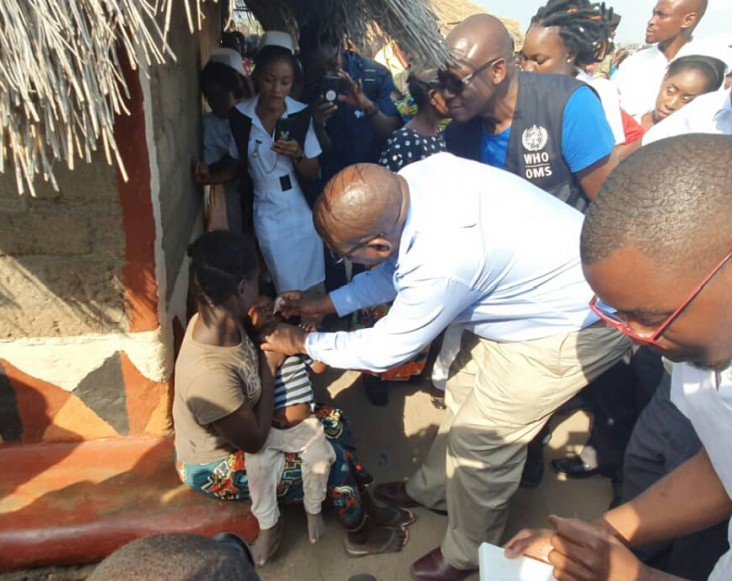Speeches Shim

Dr. Kennedy Malama, Permanent Secretary for Technical Services, Ministry of Health
Dr. Nathan Bakyaita, World Health Organization Country Representative
Ms. Noala Skinner, UNICEF Country Representative
Ms. Lucie Kasanga, District Governor, Rotary Club International
Ladies and gentlemen
All other protocols observed.
Good morning. It is my great pleasure to join you today to commemorate World Polio Day. Each year, on October 24, countries across the globe celebrate the development of the first polio vaccine and our collective progress towards elimination of this dangerous and debilitating disease. Also, on October 24, we recognize Zambia’s 56th anniversary of independence. Happy Birthday, Zambia.
Today, we are thankful to join Zambia’s Ministry of Health, the World Health Organization, UNICEF, and Rotary Club International to recognize Zambia’s work toward polio eradication. Most notably, Zambia successfully responded to the recent polio virus type 2 outbreaks in Luapula and Northwestern provinces.
I would like to commend the dedication of health workers in these provinces to reach all children who needed the vaccine. The story of Evan Tulumba, a clinical officer with the Kakoma Rural Health Center in North Western Province’s Mwinilunga District, springs to mind as someone who embodies the spirit of Zambia’s health workers during the last polio outbreak response.
On his way from Mwinilunga Boma to the health center 180 kilometers away, Evan’s vehicle got stuck on a road flooded by heavy rains. He and his team struggled for most of the day to free the vehicle, cutting trees to create a platform for the car and receiving help from nearby villagers.
Evans still found a way to keep the campaign going and on time, organizing motorbikes to transport the polio vaccines and other materials to the health facility, and making sure the vaccines reached the children who were waiting for them. I commend the dedication and commitment that health workers like Evan demonstrate every day to help their fellow Zambians.
The year of 2020 has been a significant year for polio eradication. On August 24, Nigeria was officially declared free of Wild Polio Virus, leaving Afghanistan and Pakistan as the last two polio-endemic countries. The eradication of the Wild Polio Virus from the African continent is an impressive and a significant achievement.
To sustain this milestone, governments must continue to employ the “four-pronged strategy” for polio eradication, as set forth by the Global Polio Eradication Initiative (or GPEI): 1) enhanced active paralysis surveillance; 2) maintenance of high vaccination coverage through routine immunization; 3) the provision of supplemental rounds of vaccinations; and 4) house to house vaccination “mop-up” campaigns.
The U.S. government takes its membership in GPEI seriously by providing technical assistance in the areas of outbreak response, strategy review, surveillance reviews, and monitoring and evaluation.
We commend Zambia for embracing the strategies essential for polio eradication. You have made significant gains over the past few decades, including the fact that no wild polio case has been reported since 2002.
Through the U.S. Agency for International Development (USAID) and the Centers for Disease Control and Prevention (CDC), my government supports the Ministry of Health’s Expanded Program on Immunization, which includes the provision of polio vaccines.
In 2019, the USAID Reproductive, Maternal, Newborn, Child and Adolescent Health and Nutrition Program provided almost 100,000 children under the age of one in Luapula and Muchinga provinces essential immunization services.
Additionally, CDC has worked with the Ministry of Health to strengthen acute flaccid paralysis (or AFP) surveillance thanks to technical support to the World Health Organization and the GPEI.
In October 2019, Zambia declared a national public health emergency following the confirmation of a case of polio virus type 2 in Luapula Province. In December 2019, a second confirmed case of polio virus type 2 in North-Western Province appeared
With support from the U.S. government, UNICEF, the WHO, and other cooperating partners, the Ministry of Health’s response was swift and impressive. Over the course of five months, from November 2019 to March 2020, more than 467,000 children under age five, across 20 districts in Luapula, Northern, North Western, and Western provinces, received the type 2 monovalent oral polio vaccine.
Considerable involvement of provincial and district leadership, exceptional community mobilization and awareness, high-quality logistical support, and significant engagement with traditional leaders vastly contributed to this success
The 2019 outbreak was a reminder to us all that we must remain vigilant. Moving forward, we urge the Ministry of Health to strengthen the acute flaccid paralysis (AFP) and environmental surveillance systems across the country.
We ask that you continue to build a strong immunization implementation strategy for timely, quality routine vaccination service delivery. This includes enhancing implementation of the “Reaching Every Child” strategy and consistent funding for vaccine commodities.
At a time when COVID-19 threatens the delivery of essential health services, we ask you to focus on building a resilient immunization system that can withstand any future outbreaks of public health concern.
Finally, it is vital that we harness expanded partnerships, looking beyond the health sector, to ensure a sustainable and thriving immunization program for future generations. We need to be as dedicated as Evans Tulumba by finding ways to get vaccines to every child who needs them. After all, children are Zambia’s future.
I thank you for your time today and I look forward to celebrating our exceptional progress towards polio eradication.

Comment
Make a general inquiry or suggest an improvement.